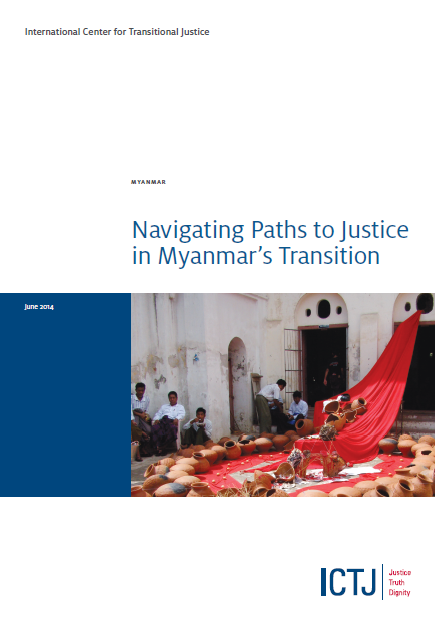Posts Tagged ‘International Center for Transitional Justice’ (6 found)
ICTJ Paper Looks at Range of Options for Dealing with Myanmar’s Troubled Past
YANGON, December 9, 2015—With hopes running high after the National League for Democracy’s landslide victory in November, a new paper by the International Center for Transitional Justice calls on the soon-to-be-established Burmese government to seriously consider taking steps to deal with Myanmar’s troubled past as a wayto help end the cycle of violence and human rights violations in the conflict-torn country […]
• • •Navigating Paths to Justice in Myanmar’s Transition
Since President Thein Sein and his government took office in 2011, Myanmar’s transition has unfolded at a pace that has surprised many and earned the acclaim of western governments, financial institutions, and private-sector investment analysts.1 The Burmese population of approximately 60 million has endured more than a half-century of military dictatorship, armed conflict, economic dysfunction, and political repression.2 A meaningful transformation into a peaceful society that enjoys economic development and functions democratically now seems plausible, though it is far from guaranteed. Ultimately, the blanket immunity afforded by the 2008 Constitution shields the acts attributable to prior regimes from any form of accountability.3 Whether the reform process will evolve to include measures that address the massive and systematic injustices of the past remains less certain.
• • •President Aquino Should Lead Move to Probe Burma
By Patrick Pierce
President Benigno Aquino III, whose father fought and died at the hands of Ferdinand Marcos’ military dictatorship and whose late mother was the leader and inspiration of the People Power uprising that re-established civilian rule and political freedom for Filipinos, should know what the people of neighboring Burma are going through. Despite recent elections and the release of Aung San Suu Kyi from house arrest, Burma’s military still controls political life.
Former military officers have formed the post-election government. Parliament is dominated by the military-backed Union Solidarity and Development Party. A quarter of legislators consist of active military officers. The military and those who led the dictatorship remain unaccountable to any independent civilian authority and continue to commit massive violations of civil and political as well as economic and social human rights with impunity […]
• •Burma: International Commission Needed to Address Impunity
A transition in Burma should entail a genuine effort to end impunity for human rights violations, including an international commission of inquiry into allegations of these crimes, said the International Center for Transitional Justice (ICTJ) on the 62nd anniversary of the signing of the Universal Declaration of Human Rights […]
• • •Impunity or Reconciliation in Burma’s Transition
The Burmese government cannot change in a meaningful way until it eliminates the culture of impunity for human rights violations that has developed during the past 48 years. The international community can help this effort […]
• • •Impunity Prolonged: Burma and its 2008 Constitution
Civil society and international organizations should meanwhile develop a coordinated approach for gathering information about human rights violations in Burma, to help prepare for eventual prosecutions and other measures dealing with the military government’s long legacy of impunity. […]
• • •









 All posts
All posts